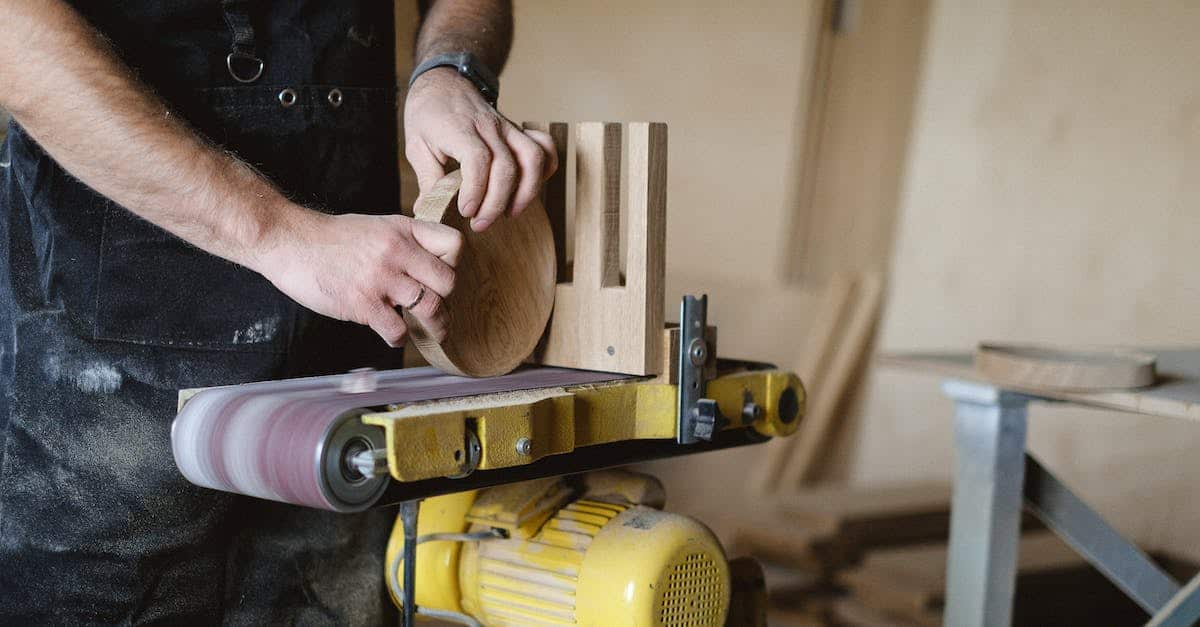When you’re knee-deep in sawdust, the last thing you want to worry about is your tools letting you down. That’s why choosing the right brand for your power tools is crucial. Dewalt and Porter Cable are two titans in the tool world, but how do they stack up against each other?
You’ve probably seen the yellow and black of Dewalt on job sites, or maybe you’re familiar with Porter Cable’s long history of reliability. In this article, you’ll get the lowdown on their performances, innovations, and value. So grab your hard hat and let’s drill down into the details of Dewalt vs Porter Cable to help you decide which tools deserve a spot in your workshop.
Performance Comparison
When you’re deeply immersed in your woodworking project, the last thing you want is a power tool that can’t keep up with your workflow. Let’s get right into how Dewalt and Porter Cable stack up.
Dewalt has built a reputation around their tools’ ability to withstand heavy-duty use. You might be familiar with their high-torque capabilities, especially if you’re power-driving screws or cutting through thick hardwoods. Their brushless motors often mean longer run times and lower maintenance, a boon when you’re in the thick of a project.
Shifting focus to Porter Cable, they’re no slouch in the performance department. Known for their dependability, their tools have the guts for jobs around the home but might lag behind when faced with the grueling demands of a professional job site. They’re perfect for your garage woodshop, though, especially if you’re working on projects that don’t require constant, high-output power.
Here’s a quick rundown of their flagship drills:
| Feature | Dewalt Model | Porter Cable Model |
|---|---|---|
| Motor | Brushless | Brushed |
| Torque | 820 UWO | 330 UWO |
| Battery Voltage | 20V | 20V |
| Battery Life | 57% longer | Standard |
| Warranty | 3 Years | 3 Years |
Dewalt drills pack a punch with more torque and brushless motors that often outlast their competition. Yet, don’t dismiss Porter Cable, as they offer solid performance with a more attractive price point—ideal for budget-conscious woodworkers.
You’ve got to weigh these factors based on the intensity and frequency of your projects. If you’re crafting heirloom furniture or need your tools to pull long hours on a rebuild, Dewalt’s power might justify the investment. For DIY home projects or light-duty tasks, Porter Cable can be your go-to without breaking the bank.
Innovations and Features
As you dive deeper into the realm of power tools, it’s impossible to miss the innovative features that set Dewalt and Porter Cable apart. Dewalt’s cutting-edge technology often includes Bluetooth connectivity, allowing you to track, manage, and customize your tools through a mobile app. FlexVolt technology is another standout, giving you the power of corded tools with the flexibility of cordless ones. This means you’re never tied down to a power outlet, and you can enjoy the same performance that’s expected from professional-grade equipment.
Porter Cable, while they may not always match Dewalt’s hefty offerings, does provide value-centric innovations. They often incorporate LED work lights into their tools, which is a game-changer for those dimly-lit projects in your garage. Battery gauge indicators are a thoughtful touch, too, empowering you with the awareness of your charge level before you embark on a project. Their tools are designed with simplicity and ease of use in mind, which means you spend less time fussing with your equipment and more time bringing your creative visions to life.
It’s the details, like ergonomic designs and lightweight construction, that can make a long day’s work feel a bit less strenuous. Dewalt excels with their ergonomic handles, reducing the fatigue you might feel after hours of work. Porter Cable, on the other hand, offers compactness and portability which are perfect for your home DIY projects and when you need to store tools in a limited space.
Your choice between Dewalt and Porter Cable might also hinge on the battery ecosystem. Dewalt uses the 20V MAX battery system across a wide range of tools, which is incredibly convenient—you can switch batteries between tools without a hitch. Porter Cable’s 20V MAX system provides a similar interchangeability, ensuring that you can keep working without pause, as long as you have a charged battery on hand.
Bear in mind the specifics of your woodworking passion when you weigh these features. Whether it’s crafting a delicate piece of furniture or tackling robust DIY projects, these innovations and features could very well be the deciding factor in your tool selection process.
Durability and Reliability
When you’re diving into your latest woodworking masterpiece, you’ll need tools that can keep up. Durability and Reliability are the bedrock of any good power tool, and this is where Dewalt and Porter Cable step into the limelight with solid reputations.
Dewalt has built a legacy on tools that can handle the rigors of a job site, enduring drops, dust, and day-to-day abuse. They’re known for their robust construction and long-lasting performance, serving as a steadfast companion through countless projects. You can count on Dewalt tools to withstand the test of time, with their high-grade materials and components designed for heavy-duty use.
Porter Cable doesn’t lag far behind, offering well-constructed tools suitable for both the hobbyist and the professional tradesperson. While they may focus on cost-effectiveness, they don’t compromise on the toughness needed for long-term use. Their gadgets can go through quite the ordeal without giving out, ensuring you get a long life from your investment.
Consider the following to gauge the toughness of your tools:
- The type of material used in the casing and components.
- Any protective features like rubber bumpers to absorb shocks.
- The track record of the model you’re interested in, which can typically be found in user reviews and professional ratings.
Admittedly, even the sturdiest power tools require proper care. Regular maintenance like cleaning, proper storage, and battery management will go a long way in preserving your tools’ functionality and longevity. No tool is completely immune to wear and tear but choosing a brand that aligns with robust engineering principles will ensure you spend more time crafting and less time repairing.
Remember that while both brands offer generous warranties, these are often predicated on normal usage conditions – another reason why maintenance shouldn’t be an afterthought. Dewalt’s warranty typically comes in at three years, while Porter Cable often provides a one-year warranty, so factor this into your decision-making process.
Price and Value
When you’re weighing the options between Dewalt and Porter Cable, your hard-earned cash is a decisive factor. Dewalt is generally pricier, but your investment might just pay off with their stellar durability and performance. Think about it—you’re crafting a piece that could become an heirloom. Doesn’t it deserve the best tools you can afford?
Porter Cable, on the other hand, gives you more of a moderate price point. If you’re starting out or sticking to DIY projects and light contracting work, Porter Cable offers reasonable quality without breaking the bank. This might be the perfect entry point as you finesse your skills and build out your workshop.
Let’s break it down by the numbers. Here’s a quick comparison of average prices for similar category drills and circular saws from both brands:
| Tool Type | Dewalt Average Price | Porter Cable Average Price |
|---|---|---|
| Drills | $160 | $120 |
| Saw | $130 | $90 |
Remember, it’s not just the initial cost you’re looking at. Consider the longevity of the tool and the cost of accessories. Dewalt’s accessories are often higher-priced, but again, they argue this is reflective of their quality and compatibility across a wide range of Dewalt tools. Porter Cable’s accessories and additional parts will generally be more affordable and still reliable for your typical around-the-house projects.
When it comes to warranties, don’t overlook the value they add. That three-year warranty with Dewalt can be a lifesaver, potentially outstripping the upfront savings from Porter Cable’s shorter warranty period. Weigh these long-term considerations against your immediate budget limitations.
In a nutshell, your decision should align with your commitment to woodworking. If you tackle demanding tasks regularly, Dewalt’s higher price might just be a worthwhile long-term investment. For those occasional weekend projects, Porter Cable can serve you well without feeling like you’ve splurged unnecessarily. Your choices should reflect your woodworking journey and the value you place on quality and durability, alongside smart financial planning.
User Feedback and Reviews
When you’re weighing Dewalt against Porter Cable, diving into user feedback and reviews can be a goldmine of insight. You’re probably looking for reliability and performance, and who better to tell you about that than fellow woodworkers who’ve put these tools to the test?
Starting with Dewalt, high praise often comes from professional contractors who won’t settle for anything less than the best-in-class performance. They’ll tell you how the power tools endure the daily grind with fewer trips to the repair shop. DIY enthusiasts share stories of Dewalt tools powering through hardwoods and tougher materials where others falter. The general consensus? Dewalt tools are workhorses.
As for Porter Cable, the feedback leans toward affordability and ease of use. Many a garage-based creator emphasizes how these tools have made their foray into woodworking remarkably smoother. The positive reviews underline that although they are lighter on the pocket, they don’t cheap out on the necessary power for most projects. Ideal for your weekend projects or light construction work, reviews suggest Porter Cable won’t disappoint the casual user.
Remember to sift through both the ravishing and critical reviews. You’ll often find valuable nuggets about battery life, precision, and the customer service experience. Pay attention to recurring themes such as:
- Tool lifespan
- Warranty service experiences
- Ergonomic design compared to workload
- Balance between cost and quality
If you’ve got friends or fellow woodworkers in your community, ask them to share their personal experiences. Firsthand accounts often paint a clearer picture of what you can expect from these brands. Plus, there’s nothing like getting a feel for the tools yourself—if possible, give them a trial run at your local hardware store. Interacting with the tools in person can tell you a lot about the balance, grip, and weight than any review can quantify.
Conclusion
You’ve seen what both Dewalt and Porter Cable have to offer, from top-notch performance to budget-friendly options. Remember, the right choice hinges on your specific needs and the kind of projects you tackle. Dewalt’s robust tools might be your go-to for heavy-duty work, while Porter Cable could be the perfect match for your casual DIY endeavors. Trust the feedback from users like you, weigh the pros and cons, and don’t shy away from getting hands-on experience before making your decision. Your perfect power tool partner is out there, ready to turn your projects into masterpieces.
Frequently Asked Questions
What are the main differences between Dewalt and Porter Cable power tools?
Dewalt tools are known for their top performance and durability, making them a favorite among professionals. Porter Cable tools offer affordability and user-friendliness, ideal for less demanding tasks and DIY projects.
Which brand is better for professional use?
Dewalt is typically preferred for professional use due to its robust construction and ability to withstand rigorous tasks frequently encountered on professional job sites.
Are Porter Cable tools suitable for heavy-duty work?
While Porter Cable tools are designed for general use, they may not be the best option for heavy-duty work. They are better suited for weekend projects and lighter construction tasks.
How important are user reviews in deciding between Dewalt and Porter Cable?
User reviews are very important as they provide insights into real-world performance, tool lifespan, and customer service experiences. Both positive and critical reviews should be considered.
Should I try out Dewalt and Porter Cable tools before purchasing?
Yes, trying out tools in person can be very beneficial. It allows you to assess the ergonomic design and get a feel for the balance and weight, helping inform your decision.
Can the cost of Dewalt tools be justified over the more affordable Porter Cable?
The cost can be justified if the tool’s performance, durability, and long-term value align with your needs, especially for professionals who use their tools regularly.
What factors should I consider apart from reviews when choosing between Dewalt and Porter Cable?
Consider tool lifespan, warranty service, ergonomic design, and how the cost measures up against the quality. Personal experiences and recommendations from peers are also valuable.




